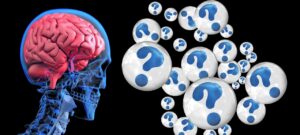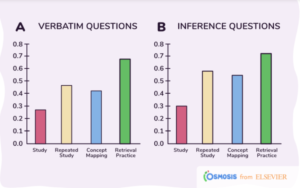Many subjects in school require memorization to succeed in that course. However, we often question whether we use an “effective” memorizing method. If you clicked to see this post, no worries! I have got you a “scientifically proven” most effective method for memorization in studying.
Active Recall
Scientific research analyzing the efficiency of ten different study methods determined that re-reading, highlighting, and summarizing notes, also known as passive study techniques, showed that this method barely engages memory retrieval during the test. Specifically, they found that re-reading the notes ranks as one of the most ineffective ways to study and retain long-term memory (Dunlosky et al., 2013).
Active recall, also known as active retrieval, is an effective study method that retrieves information from your brain. It involves creating questions based on certain units and repeatedly testing yourself on those questions. This process will force your brain to recall the information and ensure you retain the information in long-term memory. Along with increasing the possibilities to memorize certain information, it also makes you aware of topics that you are weak in.
Scientific evidence
These three studies show that the active recalling method resulted in the most successful scores from various types of questions as shown in below graph (Dunlosky et al., 2013; Karpicke & Blunt, 2011; APA PsycNet, n.d.).
(Owen, 2022)
How to Active Recall?
Flashcards:
Through the use of flashcards that have the answer on one side and a question on the other, students push themselves to try to remember the material. They can still go over the required content if they don’t succeed in doing so. According to scientists, making an effort to recollect information strengthens and develops memory pathways. Later on, it will be simpler to remember the details, thanks to this.
Writing questions when note-taking:
Writing questions that refer to the contents while taking notes will allow you to actively recall instead of just passively reading the notes. The format of the “Cornell note-taking method” will help you make a note for active recall as you can write questions in the left column of your notes. I have already written about some note-taking methods, including Cornell methods, on my past blog. So, I hope you can check this out, too!
Practice questions:
This also gives you an opportunity to test your brain and help commit things to memory through active recalling. The purpose of this is not to get everything right but rather to make your brain get used to the process of recalling certain information.
Become a teacher:
Act like you are a teacher who has to teach students who do not know anything about this topic. By doing so, you will be able to access the information and even small details through active thinking. If you think you are lacking in some parts of information, or your audience thinks some parts are lacking, encourage them to explain more about those certain parts. This process will make you actively think about your weaknesses and retain them in your memory for your exams. Along with this active recalling, by speaking out like a teacher, the study by Lafleur and Boucher determined that oro-sensory (the feeling when speaking) review improved the memory of spoken forms and resulted in repeating words aloud memorized better than studying the words silently. Thus, we actively recall and use our oro-sense, which can help you enhance your memorizing skills.
Of course, these methods may not work for everyone, and each person might have the best studying method that they have. If you do, trust in yourself and follow them! I hope that this blog post helped people who are searching for a new effective studying method or who want to explore other studying methods to just try! Who knows, this scientifically proven way of studying might help you in semester 2!!
Article Sources: 1 / 2 / 3 / 4 / 5 / 6 / 7




